Why Relatives Should Be Allowed To Watch Resuscitation on Loved Ones
VerifiedAdded on 2023/06/11
|6
|1649
|248
AI Summary
This article discusses the debate on whether relatives should be allowed to watch resuscitation on their loved ones. The benefits and drawbacks of their inclusion are explored through research studies.
Contribute Materials
Your contribution can guide someone’s learning journey. Share your
documents today.
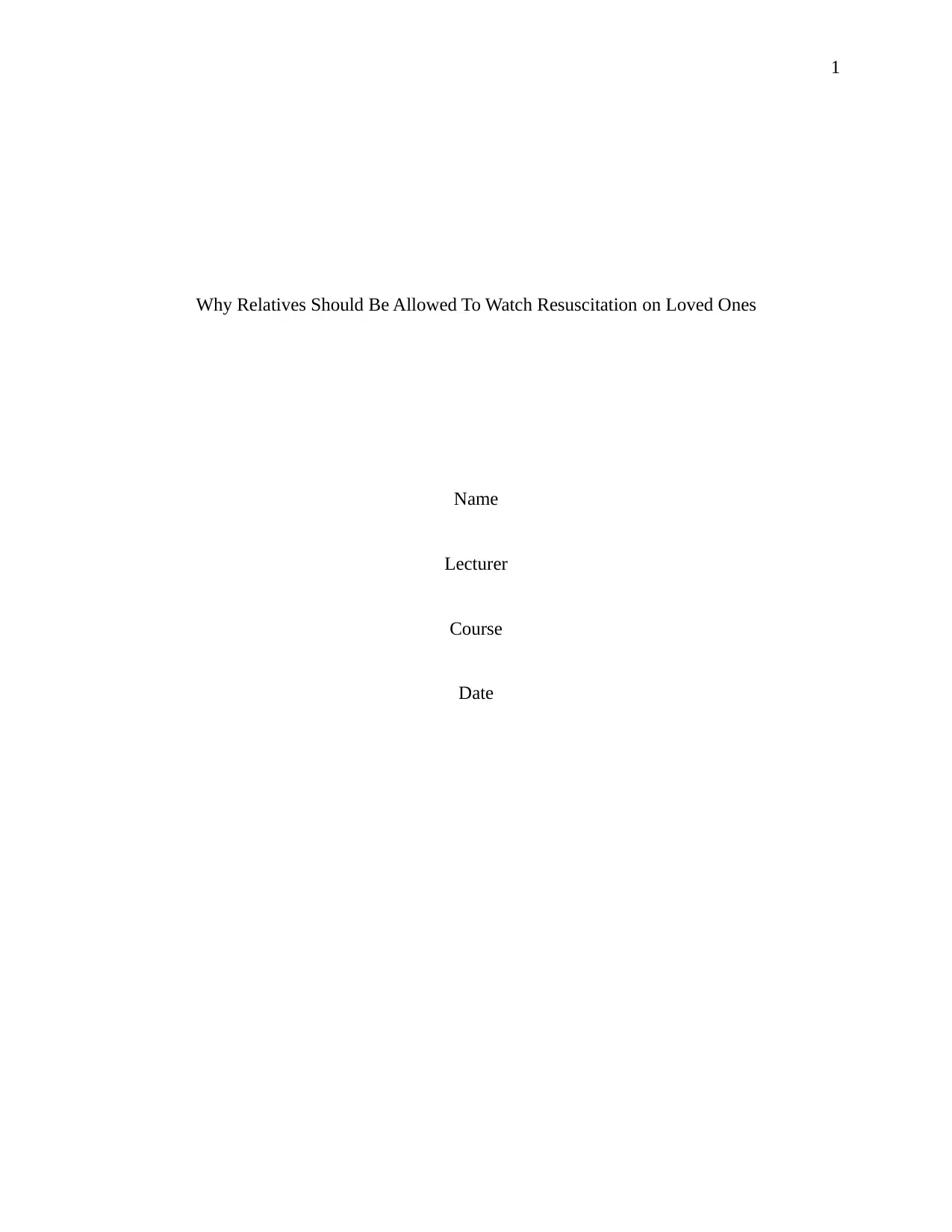
1
Why Relatives Should Be Allowed To Watch Resuscitation on Loved Ones
Name
Lecturer
Course
Date
Why Relatives Should Be Allowed To Watch Resuscitation on Loved Ones
Name
Lecturer
Course
Date
Secure Best Marks with AI Grader
Need help grading? Try our AI Grader for instant feedback on your assignments.
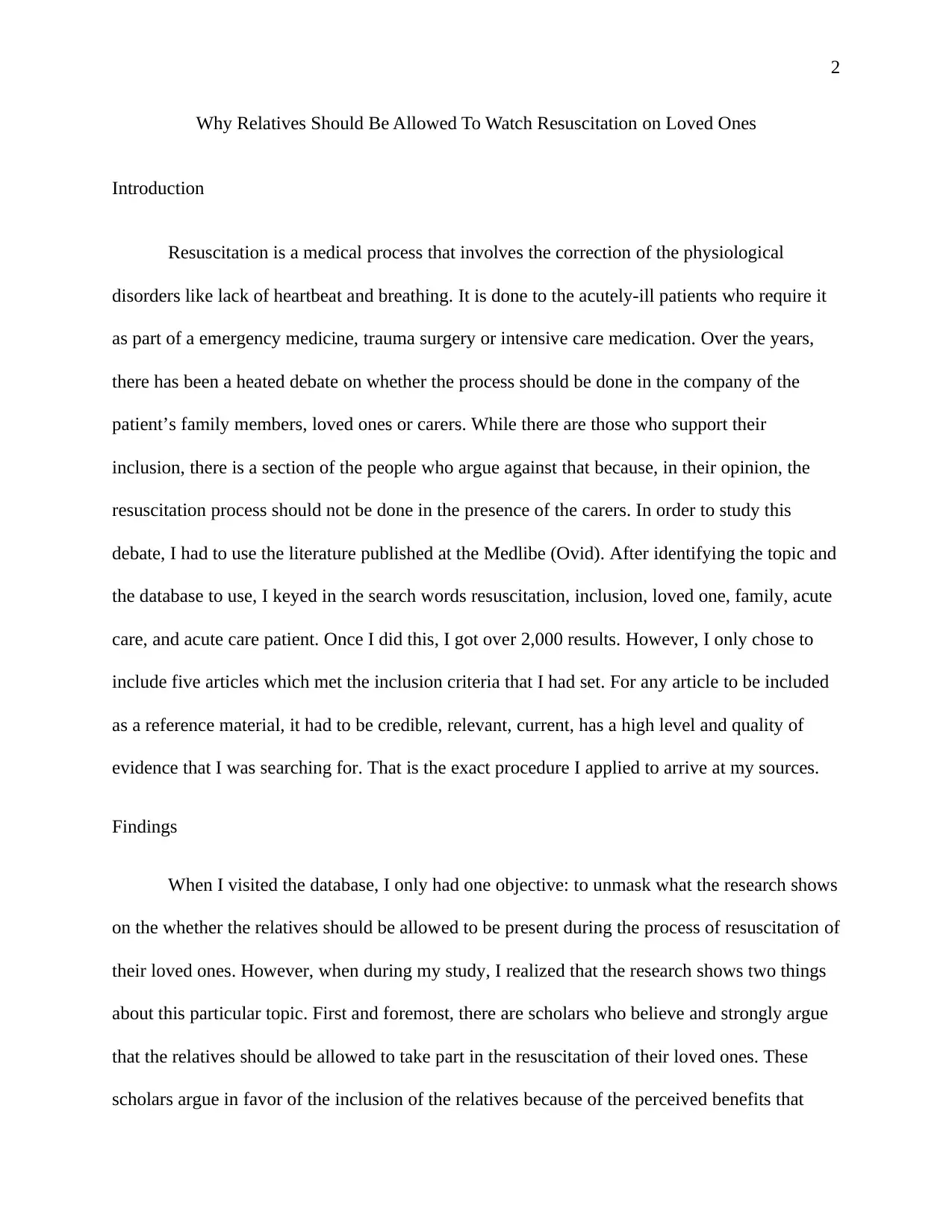
2
Why Relatives Should Be Allowed To Watch Resuscitation on Loved Ones
Introduction
Resuscitation is a medical process that involves the correction of the physiological
disorders like lack of heartbeat and breathing. It is done to the acutely-ill patients who require it
as part of a emergency medicine, trauma surgery or intensive care medication. Over the years,
there has been a heated debate on whether the process should be done in the company of the
patient’s family members, loved ones or carers. While there are those who support their
inclusion, there is a section of the people who argue against that because, in their opinion, the
resuscitation process should not be done in the presence of the carers. In order to study this
debate, I had to use the literature published at the Medlibe (Ovid). After identifying the topic and
the database to use, I keyed in the search words resuscitation, inclusion, loved one, family, acute
care, and acute care patient. Once I did this, I got over 2,000 results. However, I only chose to
include five articles which met the inclusion criteria that I had set. For any article to be included
as a reference material, it had to be credible, relevant, current, has a high level and quality of
evidence that I was searching for. That is the exact procedure I applied to arrive at my sources.
Findings
When I visited the database, I only had one objective: to unmask what the research shows
on the whether the relatives should be allowed to be present during the process of resuscitation of
their loved ones. However, when during my study, I realized that the research shows two things
about this particular topic. First and foremost, there are scholars who believe and strongly argue
that the relatives should be allowed to take part in the resuscitation of their loved ones. These
scholars argue in favor of the inclusion of the relatives because of the perceived benefits that
Why Relatives Should Be Allowed To Watch Resuscitation on Loved Ones
Introduction
Resuscitation is a medical process that involves the correction of the physiological
disorders like lack of heartbeat and breathing. It is done to the acutely-ill patients who require it
as part of a emergency medicine, trauma surgery or intensive care medication. Over the years,
there has been a heated debate on whether the process should be done in the company of the
patient’s family members, loved ones or carers. While there are those who support their
inclusion, there is a section of the people who argue against that because, in their opinion, the
resuscitation process should not be done in the presence of the carers. In order to study this
debate, I had to use the literature published at the Medlibe (Ovid). After identifying the topic and
the database to use, I keyed in the search words resuscitation, inclusion, loved one, family, acute
care, and acute care patient. Once I did this, I got over 2,000 results. However, I only chose to
include five articles which met the inclusion criteria that I had set. For any article to be included
as a reference material, it had to be credible, relevant, current, has a high level and quality of
evidence that I was searching for. That is the exact procedure I applied to arrive at my sources.
Findings
When I visited the database, I only had one objective: to unmask what the research shows
on the whether the relatives should be allowed to be present during the process of resuscitation of
their loved ones. However, when during my study, I realized that the research shows two things
about this particular topic. First and foremost, there are scholars who believe and strongly argue
that the relatives should be allowed to take part in the resuscitation of their loved ones. These
scholars argue in favor of the inclusion of the relatives because of the perceived benefits that
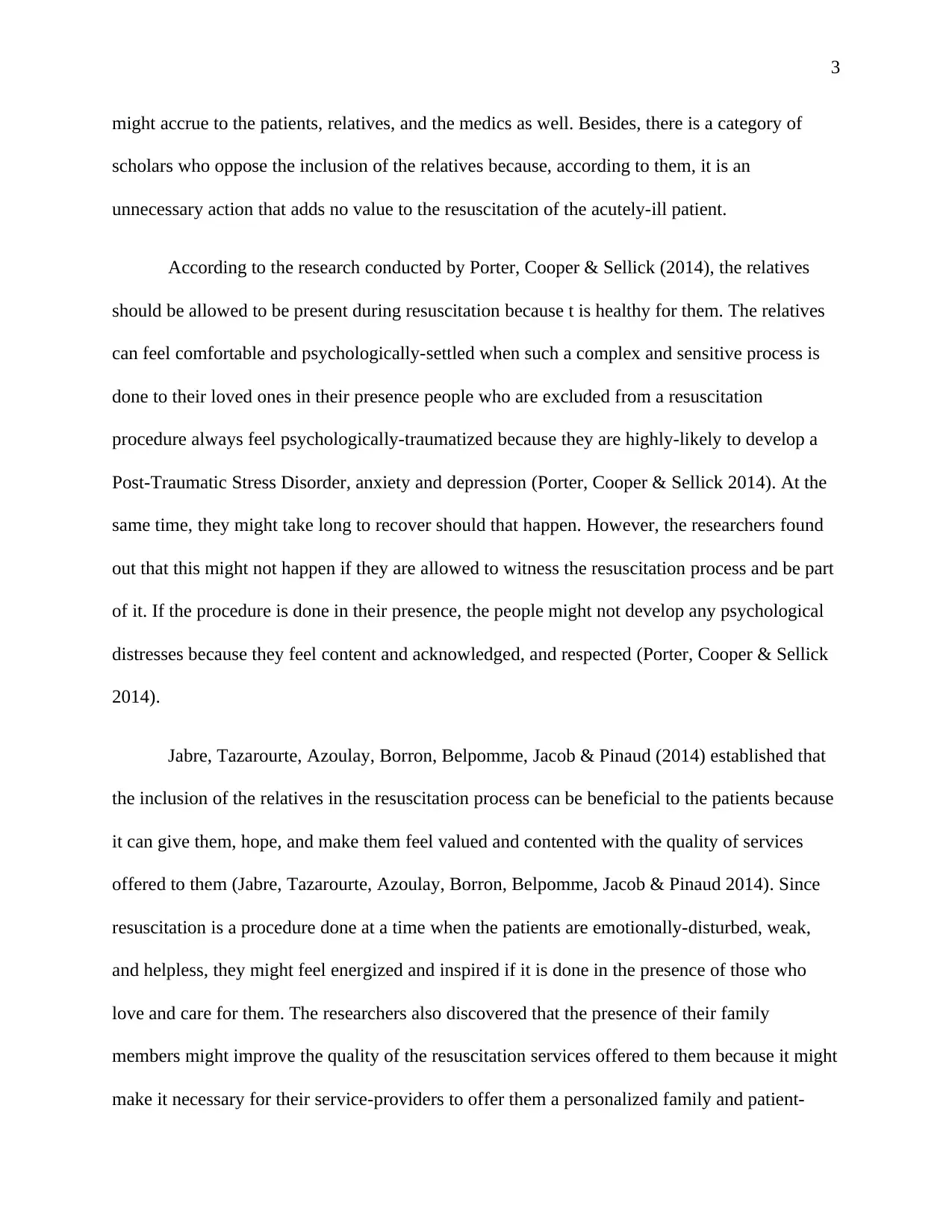
3
might accrue to the patients, relatives, and the medics as well. Besides, there is a category of
scholars who oppose the inclusion of the relatives because, according to them, it is an
unnecessary action that adds no value to the resuscitation of the acutely-ill patient.
According to the research conducted by Porter, Cooper & Sellick (2014), the relatives
should be allowed to be present during resuscitation because t is healthy for them. The relatives
can feel comfortable and psychologically-settled when such a complex and sensitive process is
done to their loved ones in their presence people who are excluded from a resuscitation
procedure always feel psychologically-traumatized because they are highly-likely to develop a
Post-Traumatic Stress Disorder, anxiety and depression (Porter, Cooper & Sellick 2014). At the
same time, they might take long to recover should that happen. However, the researchers found
out that this might not happen if they are allowed to witness the resuscitation process and be part
of it. If the procedure is done in their presence, the people might not develop any psychological
distresses because they feel content and acknowledged, and respected (Porter, Cooper & Sellick
2014).
Jabre, Tazarourte, Azoulay, Borron, Belpomme, Jacob & Pinaud (2014) established that
the inclusion of the relatives in the resuscitation process can be beneficial to the patients because
it can give them, hope, and make them feel valued and contented with the quality of services
offered to them (Jabre, Tazarourte, Azoulay, Borron, Belpomme, Jacob & Pinaud 2014). Since
resuscitation is a procedure done at a time when the patients are emotionally-disturbed, weak,
and helpless, they might feel energized and inspired if it is done in the presence of those who
love and care for them. The researchers also discovered that the presence of their family
members might improve the quality of the resuscitation services offered to them because it might
make it necessary for their service-providers to offer them a personalized family and patient-
might accrue to the patients, relatives, and the medics as well. Besides, there is a category of
scholars who oppose the inclusion of the relatives because, according to them, it is an
unnecessary action that adds no value to the resuscitation of the acutely-ill patient.
According to the research conducted by Porter, Cooper & Sellick (2014), the relatives
should be allowed to be present during resuscitation because t is healthy for them. The relatives
can feel comfortable and psychologically-settled when such a complex and sensitive process is
done to their loved ones in their presence people who are excluded from a resuscitation
procedure always feel psychologically-traumatized because they are highly-likely to develop a
Post-Traumatic Stress Disorder, anxiety and depression (Porter, Cooper & Sellick 2014). At the
same time, they might take long to recover should that happen. However, the researchers found
out that this might not happen if they are allowed to witness the resuscitation process and be part
of it. If the procedure is done in their presence, the people might not develop any psychological
distresses because they feel content and acknowledged, and respected (Porter, Cooper & Sellick
2014).
Jabre, Tazarourte, Azoulay, Borron, Belpomme, Jacob & Pinaud (2014) established that
the inclusion of the relatives in the resuscitation process can be beneficial to the patients because
it can give them, hope, and make them feel valued and contented with the quality of services
offered to them (Jabre, Tazarourte, Azoulay, Borron, Belpomme, Jacob & Pinaud 2014). Since
resuscitation is a procedure done at a time when the patients are emotionally-disturbed, weak,
and helpless, they might feel energized and inspired if it is done in the presence of those who
love and care for them. The researchers also discovered that the presence of their family
members might improve the quality of the resuscitation services offered to them because it might
make it necessary for their service-providers to offer them a personalized family and patient-
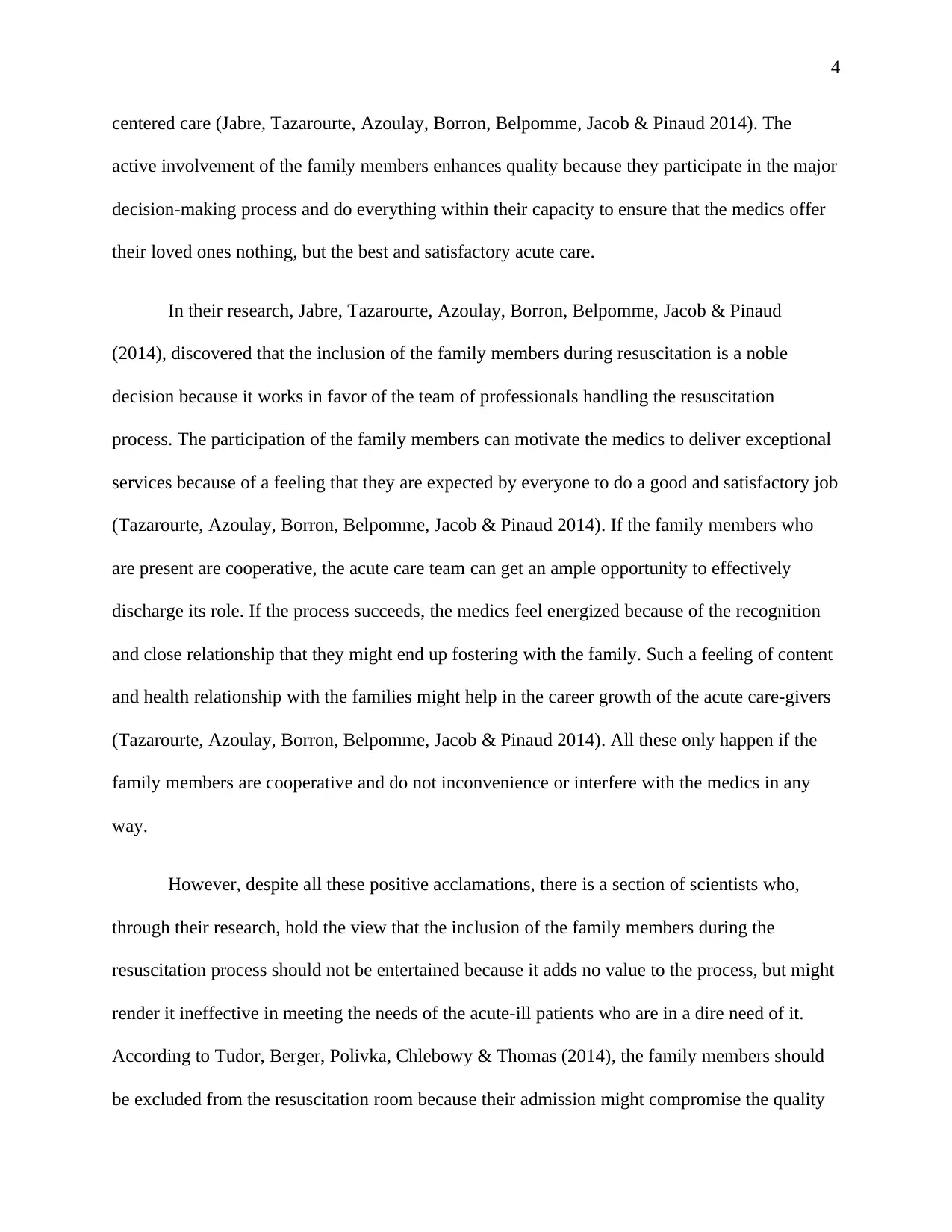
4
centered care (Jabre, Tazarourte, Azoulay, Borron, Belpomme, Jacob & Pinaud 2014). The
active involvement of the family members enhances quality because they participate in the major
decision-making process and do everything within their capacity to ensure that the medics offer
their loved ones nothing, but the best and satisfactory acute care.
In their research, Jabre, Tazarourte, Azoulay, Borron, Belpomme, Jacob & Pinaud
(2014), discovered that the inclusion of the family members during resuscitation is a noble
decision because it works in favor of the team of professionals handling the resuscitation
process. The participation of the family members can motivate the medics to deliver exceptional
services because of a feeling that they are expected by everyone to do a good and satisfactory job
(Tazarourte, Azoulay, Borron, Belpomme, Jacob & Pinaud 2014). If the family members who
are present are cooperative, the acute care team can get an ample opportunity to effectively
discharge its role. If the process succeeds, the medics feel energized because of the recognition
and close relationship that they might end up fostering with the family. Such a feeling of content
and health relationship with the families might help in the career growth of the acute care-givers
(Tazarourte, Azoulay, Borron, Belpomme, Jacob & Pinaud 2014). All these only happen if the
family members are cooperative and do not inconvenience or interfere with the medics in any
way.
However, despite all these positive acclamations, there is a section of scientists who,
through their research, hold the view that the inclusion of the family members during the
resuscitation process should not be entertained because it adds no value to the process, but might
render it ineffective in meeting the needs of the acute-ill patients who are in a dire need of it.
According to Tudor, Berger, Polivka, Chlebowy & Thomas (2014), the family members should
be excluded from the resuscitation room because their admission might compromise the quality
centered care (Jabre, Tazarourte, Azoulay, Borron, Belpomme, Jacob & Pinaud 2014). The
active involvement of the family members enhances quality because they participate in the major
decision-making process and do everything within their capacity to ensure that the medics offer
their loved ones nothing, but the best and satisfactory acute care.
In their research, Jabre, Tazarourte, Azoulay, Borron, Belpomme, Jacob & Pinaud
(2014), discovered that the inclusion of the family members during resuscitation is a noble
decision because it works in favor of the team of professionals handling the resuscitation
process. The participation of the family members can motivate the medics to deliver exceptional
services because of a feeling that they are expected by everyone to do a good and satisfactory job
(Tazarourte, Azoulay, Borron, Belpomme, Jacob & Pinaud 2014). If the family members who
are present are cooperative, the acute care team can get an ample opportunity to effectively
discharge its role. If the process succeeds, the medics feel energized because of the recognition
and close relationship that they might end up fostering with the family. Such a feeling of content
and health relationship with the families might help in the career growth of the acute care-givers
(Tazarourte, Azoulay, Borron, Belpomme, Jacob & Pinaud 2014). All these only happen if the
family members are cooperative and do not inconvenience or interfere with the medics in any
way.
However, despite all these positive acclamations, there is a section of scientists who,
through their research, hold the view that the inclusion of the family members during the
resuscitation process should not be entertained because it adds no value to the process, but might
render it ineffective in meeting the needs of the acute-ill patients who are in a dire need of it.
According to Tudor, Berger, Polivka, Chlebowy & Thomas (2014), the family members should
be excluded from the resuscitation room because their admission might compromise the quality
Secure Best Marks with AI Grader
Need help grading? Try our AI Grader for instant feedback on your assignments.
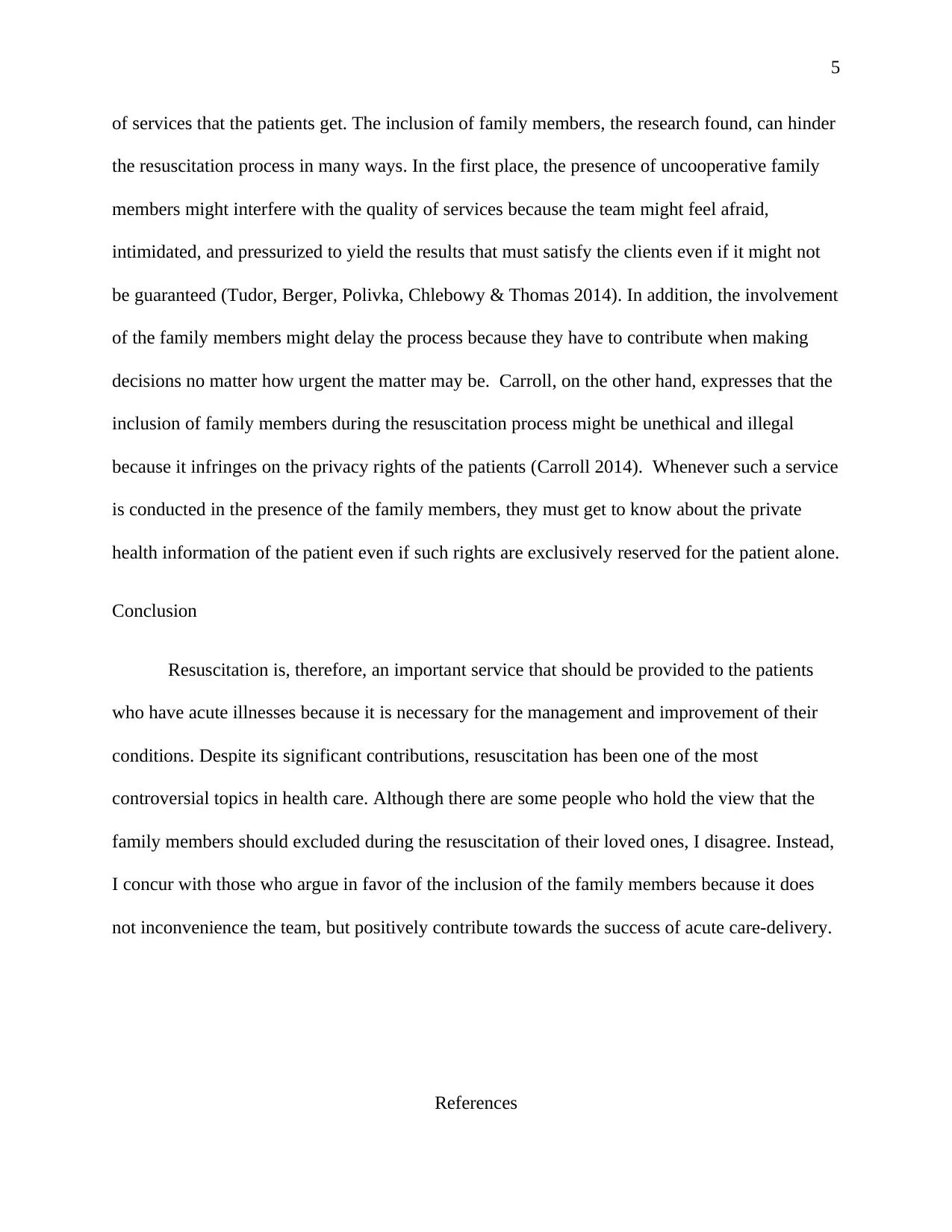
5
of services that the patients get. The inclusion of family members, the research found, can hinder
the resuscitation process in many ways. In the first place, the presence of uncooperative family
members might interfere with the quality of services because the team might feel afraid,
intimidated, and pressurized to yield the results that must satisfy the clients even if it might not
be guaranteed (Tudor, Berger, Polivka, Chlebowy & Thomas 2014). In addition, the involvement
of the family members might delay the process because they have to contribute when making
decisions no matter how urgent the matter may be. Carroll, on the other hand, expresses that the
inclusion of family members during the resuscitation process might be unethical and illegal
because it infringes on the privacy rights of the patients (Carroll 2014). Whenever such a service
is conducted in the presence of the family members, they must get to know about the private
health information of the patient even if such rights are exclusively reserved for the patient alone.
Conclusion
Resuscitation is, therefore, an important service that should be provided to the patients
who have acute illnesses because it is necessary for the management and improvement of their
conditions. Despite its significant contributions, resuscitation has been one of the most
controversial topics in health care. Although there are some people who hold the view that the
family members should excluded during the resuscitation of their loved ones, I disagree. Instead,
I concur with those who argue in favor of the inclusion of the family members because it does
not inconvenience the team, but positively contribute towards the success of acute care-delivery.
References
of services that the patients get. The inclusion of family members, the research found, can hinder
the resuscitation process in many ways. In the first place, the presence of uncooperative family
members might interfere with the quality of services because the team might feel afraid,
intimidated, and pressurized to yield the results that must satisfy the clients even if it might not
be guaranteed (Tudor, Berger, Polivka, Chlebowy & Thomas 2014). In addition, the involvement
of the family members might delay the process because they have to contribute when making
decisions no matter how urgent the matter may be. Carroll, on the other hand, expresses that the
inclusion of family members during the resuscitation process might be unethical and illegal
because it infringes on the privacy rights of the patients (Carroll 2014). Whenever such a service
is conducted in the presence of the family members, they must get to know about the private
health information of the patient even if such rights are exclusively reserved for the patient alone.
Conclusion
Resuscitation is, therefore, an important service that should be provided to the patients
who have acute illnesses because it is necessary for the management and improvement of their
conditions. Despite its significant contributions, resuscitation has been one of the most
controversial topics in health care. Although there are some people who hold the view that the
family members should excluded during the resuscitation of their loved ones, I disagree. Instead,
I concur with those who argue in favor of the inclusion of the family members because it does
not inconvenience the team, but positively contribute towards the success of acute care-delivery.
References
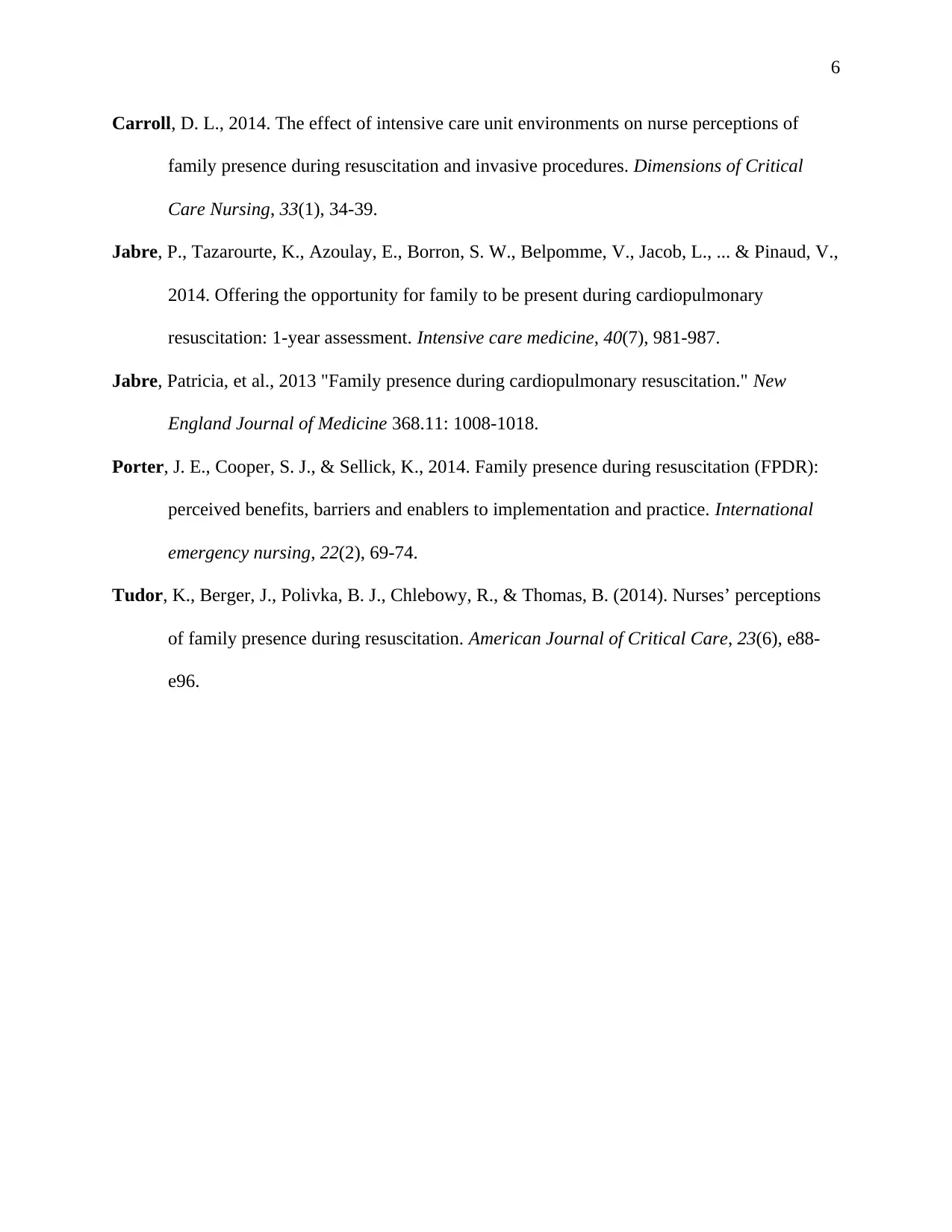
6
Carroll, D. L., 2014. The effect of intensive care unit environments on nurse perceptions of
family presence during resuscitation and invasive procedures. Dimensions of Critical
Care Nursing, 33(1), 34-39.
Jabre, P., Tazarourte, K., Azoulay, E., Borron, S. W., Belpomme, V., Jacob, L., ... & Pinaud, V.,
2014. Offering the opportunity for family to be present during cardiopulmonary
resuscitation: 1-year assessment. Intensive care medicine, 40(7), 981-987.
Jabre, Patricia, et al., 2013 "Family presence during cardiopulmonary resuscitation." New
England Journal of Medicine 368.11: 1008-1018.
Porter, J. E., Cooper, S. J., & Sellick, K., 2014. Family presence during resuscitation (FPDR):
perceived benefits, barriers and enablers to implementation and practice. International
emergency nursing, 22(2), 69-74.
Tudor, K., Berger, J., Polivka, B. J., Chlebowy, R., & Thomas, B. (2014). Nurses’ perceptions
of family presence during resuscitation. American Journal of Critical Care, 23(6), e88-
e96.
Carroll, D. L., 2014. The effect of intensive care unit environments on nurse perceptions of
family presence during resuscitation and invasive procedures. Dimensions of Critical
Care Nursing, 33(1), 34-39.
Jabre, P., Tazarourte, K., Azoulay, E., Borron, S. W., Belpomme, V., Jacob, L., ... & Pinaud, V.,
2014. Offering the opportunity for family to be present during cardiopulmonary
resuscitation: 1-year assessment. Intensive care medicine, 40(7), 981-987.
Jabre, Patricia, et al., 2013 "Family presence during cardiopulmonary resuscitation." New
England Journal of Medicine 368.11: 1008-1018.
Porter, J. E., Cooper, S. J., & Sellick, K., 2014. Family presence during resuscitation (FPDR):
perceived benefits, barriers and enablers to implementation and practice. International
emergency nursing, 22(2), 69-74.
Tudor, K., Berger, J., Polivka, B. J., Chlebowy, R., & Thomas, B. (2014). Nurses’ perceptions
of family presence during resuscitation. American Journal of Critical Care, 23(6), e88-
e96.
1 out of 6
Related Documents
Your All-in-One AI-Powered Toolkit for Academic Success.
+13062052269
info@desklib.com
Available 24*7 on WhatsApp / Email
![[object Object]](/_next/static/media/star-bottom.7253800d.svg)
Unlock your academic potential
© 2024 | Zucol Services PVT LTD | All rights reserved.





